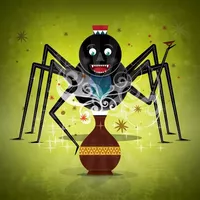(Anansi and Wisdom) أنانسي و الحكمة
(Anansi und Weisheit)
(Anansi and Wisdom)
(Anansi y la Sabiduría)
(Anansi et la sagesse)
(아난시와 지혜)
(Anansi i Mądrość)
(Anansi e Sabedoria)
(Ананси и Мудрость)
في قديم الزمان، كان الناس لا يعرفون شيئا.
Once upon a time, people knew nothing.
W starożytności ludzie nic nie wiedzieli.
Nos tempos antigos, as pessoas não sabiam nada.
كانوا لا يعرفون طريقة زراعة المحاصيل، أو نسج الأقمشة، أو صناعة الأدوات الحديدية.
Sie wussten nicht, wie man Getreide anbaut, Stoffe webt oder Eisenwerkzeuge herstellt.
They did not know how to grow crops, weave cloth, or make iron tools.
Nie umieli uprawiać roślin, tkać tkanin ani wytwarzać narzędzi z żelaza.
Eles não sabiam cultivar, tecer tecidos ou fazer ferramentas de ferro.
كان هناك الإله نيام في السماء وكان يملك كل الحكمة الموجودة في العالم.
Es gab einen Gott, der im Himmel schlief, und er besaß alle Weisheit, die es auf der Welt gibt.
There was a god sleeping in the sky and he possessed all the wisdom that exists in the world.
W niebie spał bóg, który posiadał całą mądrość świata.
Havia um deus dormindo no céu que tinha toda a sabedoria do mundo.
وكان محتفظا بها في وعاء من الفخار.
It was kept in a clay pot.
Trzymano go w glinianym garnku.
في يوم من الأيام، قرر نيام أن يعطي وعاء الحكمة إلى أنانسي.
One day, Niam decides to give the pot of wisdom to Anansi.
Pewnego dnia Nyam postanowił dać misę mądrości Anansiemu.
Um dia, Nyam decidiu dar a tigela da sabedoria a Anansi.
في كل مرة كان أنانسي ينظر في وعاء الفخار، كان يتعلم شيئا جديدا.
Za każdym razem, gdy Anansi patrzył na gliniany garnek, uczył się czegoś nowego.
Cada vez que Anansi olhava para o pote de barro, aprendia algo novo.
كان أمرا مثيرا!
It was exciting!
To było ekscytujące!
Foi emocionante!
فكر الجشع أنانسي: “أنا سوف أحتفظ بالوعاء في مكان آمن في أعلى شجرة طويلة.
Der gierige Anansi dachte: „Ich werde den Topf an einem sicheren Ort oben auf einem hohen Baum aufbewahren.“
Greedy Anansi thought: “I will keep the pot in a safe place at the top of a tall tree.
O ganancioso Anansi pensou: “Vou guardar o vaso em um lugar seguro no topo de uma árvore alta.
بعد ذلك يمكن أن يكون كل شيء لنفسي!” ونسج خيط طويل، ولفه حول وعاء الطين، وربطه إلى بطنه.
Dann kann ich alles für mich alleine haben!“ Und er webte einen langen Faden und wickelte ihn um den Tontopf und band ihn an seinen Bauch.
Then I can have it all to myself!” He wove a long thread, wrapped it around the clay pot, and tied it to his stomach.
Então poderei ficar com tudo para mim!” Ele teceu um longo fio, enrolou-o no pote de barro e amarrou-o na barriga.
بدأ تسلق الشجرة.
ولكن كان من الصعب تسلق الشجرة والوعاء يخبط في ركبتيه طوال الوقت.
But it was hard to climb the tree with the pot banging on his knees the whole time.
Mas era difícil subir na árvore com a panela batendo nos joelhos o tempo todo.
خلال كل هذا الوقت كان ابن أنانسي الصغير يشاهد من أسفل الشجرة.
All this time Anansi's little son was watching from under the tree.
Durante todo esse tempo, o filho pequeno de Anansi observava debaixo da árvore.
وقال: “ألن يكون من الأسهل تسلق الشجرة إذا كان الوعاء مربوطا إلى ظهرك بدلا من بطنك؟”
“Wouldn't it be easier to climb the tree if the pot was tied to your back instead of your stomach?” he said.
Ele disse: “Não seria mais fácil subir na árvore se o vaso estivesse amarrado nas suas costas em vez de na sua barriga?”
حاول أنانسي ربط وعاء الفخار المليء بالحكمة إلى ظهره، وأصبح فعلا تسلق الشجرة أسهل.
Anansi tried to tie the pottery pot full of wisdom to his back, and it actually became easier to climb the tree.
Anansi tentou amarrar o pote de barro cheio de sabedoria em suas costas, e subir na árvore ficou realmente mais fácil.
خلال وقت قصير وصل إلى أعلى الشجرة.
In a short time he reached the top of the tree.
Em pouco tempo ele alcançou o topo da árvore.
ولكن بعد ذلك توقف وفكر، “أنا من المفترض أن أكون صاحب كل الحكمة، وهنا كان ابني أذكى مني!”
Mas então ele parou e pensou: “Eu deveria ser muito sábio, e aqui meu filho era mais esperto do que eu!”
كان أنانسي غاضب جدا وألقى وعاء الفخار إلى أسفل الشجرة.
Anansi was very angry and threw the crock pot down the tree.
Anansi ficou muito zangada e jogou o pote de barro na árvore.
تحطم الوعاء إلى قطع صغيرة على الأرض.
The pot shattered into small pieces on the floor.
A tigela se quebrou em pequenos pedaços no chão.
وأصبحت الحكمة للجميع لكي يتشاركوها.
It became wisdom for everyone to share.
Tornou-se sabedoria para todos compartilharem.
وهكذا تعلم الناس الفلاحة، ونسج الأقمشة، وصناعة الأدوات الحديدية، وجميع الأشياء الأخرى التي يعرف الناس كيفية القيام بها.
Thus people learned to farm, weave cloth, make iron tools, and all the other things people knew how to do.
Assim, as pessoas aprenderam a cultivar, a tecer tecidos, a fabricar ferramentas de ferro e todas as outras coisas que sabiam fazer.

